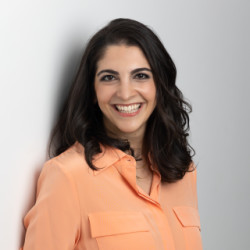For most, medicine is considered a calling. For me, it was a safe choice. As the product of Iranian immigrants, I was encouraged early and often to become a physician. My mom recalled how only the most intelligent students in Iran successfully obtained placements in medical school, assuring themselves a lifetime of financial prosperity and job security in a highly esteemed profession.
In truth, my passions lie elsewhere. From a young age, I gravitated toward literature and creative writing. In college, I nearly declared an English major, and one of my professors strongly urged me to consider a career in law. Yet the guilt I felt about potentially disappointing my parents, who had sacrificed so much to afford me the opportunities I had received, won out, and I found myself beginning the arduous journey to becoming a medical doctor.
The role models I identified throughout my medical training were those I viewed as having taken the reliable and respectable path to success, advancing the profession through research and teaching while rising through the ranks in academia. In other words, it seemed to be a safe and financially sound decision. I began working on retina research in medical school and continued it throughout residency and fellowship to lay the groundwork for a future at a large academic center. Although many of my professors were disillusioned with the state of medicine and experienced what we now label burnout, they were often dismissive of private practice physicians, describing them as lacking the rigor and dedication of those in academia.
After leaving my first attending job because the practice owner was committing health care fraud, I pivoted to the role that afforded me the professional respect and financial safety I was taught to covet — a junior professorship position at a large academic center with teaching, research, and clinical responsibilities. While I thoroughly enjoyed teaching, my several-hour daily commute, trauma call responsibilities, and growing schedule as the only oculoplastic specialist in the system at the time proved to be mentally and physically taxing.
In the meantime, I became a mother, juggling the responsibilities of a newborn with the increasing clinical demands at a center more than an hour away. My onboarding had come with the assurance of a forthcoming satellite office closer to my home; several years later, there was no satellite office to be found (nor has it been established to date). Once I heard that our outpatient surgical facility was being relocated even farther from my house, I realized my risk-free, “safe” professional choice meant a future that was encroaching on the time I wished to spend on my other interests and my family. The financial safety would come at the cost of my well-being. I decided I had to explore alternatives.
I interviewed with a behemoth multi-physician-owned group in a region closer to my home that offered a nice salary and benefits. Still, I would need to sign a draconian restrictive covenant, do comprehensive ophthalmology and oculoplastics, and pack my schedule with patients. Once again, the perceived security of joining a large group would come at the cost of my personal autonomy.
It was then I began to seriously consider the idea of starting a private practice. The idea was first suggested to me by a colleague looking to office-share while I was seeking an escape from my first job. My husband met the idea with skepticism, suspecting the startup costs would be astronomical and impossible for us to weather on his salary alone, given our existing student loans and newly acquired mortgage. I had always viewed entrepreneurship as an endeavor for risk-takers, and it seemed in direct opposition to the professional security I had worked so hard to obtain through my medical degree. Not having had any personal or professional experience with solo practice and fearing the enforceability of my restrictive covenant, I found the idea overwhelming and decided he was probably right.
But now, with dwindling job options in the area that would allow me to limit my practice to oculoplastics and have control over my schedule, the idea seemed to be the only viable one to attain the personal stability I was seeking. I turned down the offer from the large group and contacted my colleague who had secured the lease on the office space we had explored together, to sublease from him one day a week. I obtained a line of credit, established a business entity through my accountant, selected an EMR company, and worked with a biller to credential myself and my business with insurance companies and Medicare. Two of my mentors at the academic center were critically helpful in encouraging me to pursue my practice. These mentors, along with an email group of solo ophthalmologists I joined, served as valuable resources for questions I had along the way.
Just as I opened the doors, the pandemic hit. With the future of medicine seeming so uncertain, I strongly considered shuttering my then-nascent practice and capitulating to one of the big-box medicine positions in our area. As the lockdowns were lifted, I realized all the hard work I had put in to lay the groundwork for my practice had paid off. My schedule went from the rare phone call and patient encounter to full clinical and surgical days, and I felt confident enough to sign my first commercial lease. I had been maintaining part-time per diem positions at the academic center where I worked and at another practice to supplement my business revenue, but as my practice became productive on its own, I phased those out and consolidated everything into my own practice.
Now, five years into solo practice, I am the happiest I have ever been professionally. I can control the types and number of patients I see and the procedures I perform. I have a phenomenal team of women who help make my dream practice a reality every day. Many of the patients I see have become like family over the years, and they appreciate that our practice is more intimate than big-box practices in the area, does not have a phone tree, and prioritizes their concerns by giving them the time and attention they need. My negligible daily commute means I have extra time to enjoy special moments with my daughter; to read and write regularly, and even to take classes in creative writing; to learn new hobbies like sewing; and to audit courses I loved in college, like my Shakespeare seminars. I started strength training and reintroduced journaling to my life. I can see friends and travel to recharge.
My journey to solo practice was forged out of necessity, and would not have been one I considered initially, having followed the traditional path specifically for its perceived professional security. However, that “secure” path also led me to feelings of burnout and thoughts of abandoning my career altogether. In hindsight, for individuals like myself who entered medicine for reasons other than an intrinsic calling, running a solo practice was the only way I could continue practicing as a physician while also preserving elements of myself and my interests that I would otherwise have lost in the name of perceived prestige and stability.
Solo practice is not without its hardships (speaking personally, human resources and administrative tasks can at times be demoralizing), but having experienced every other iteration of physician practice settings including large and small group practice and academics, I can safely say that for those individuals who have broad interests outside of medicine and who feel like a cog in the wheel, solo practice may be the best option to recapture the autonomy we have collectively lost as a profession. I suspect that with the increasing encroachment of private equity and insurance companies on our profession and the commensurate mounting levels of physician and patient frustration, we will begin to see a resurgence of smaller, concierge-type practices that are working to combat physician burnout, eliminate the middle man, and restore the laudable patient-doctor trust and relationship that has been eroded over the years.
What is your experience with finding autonomy and work-life balance in medicine? Share in the comments!
Dr. Mahsa Sohrab is an oculoplastic surgeon located in Greenwich, CT. When she is not busy managing her own practice, she enjoys writing, sewing, reading, and globetrotting with her husband and daughter. Follow her on Instagram @drmahsasohrab. Dr. Sohrab is a 2024–2025 Doximity Op-Med Fellow.
Image by z_wei / Getty







